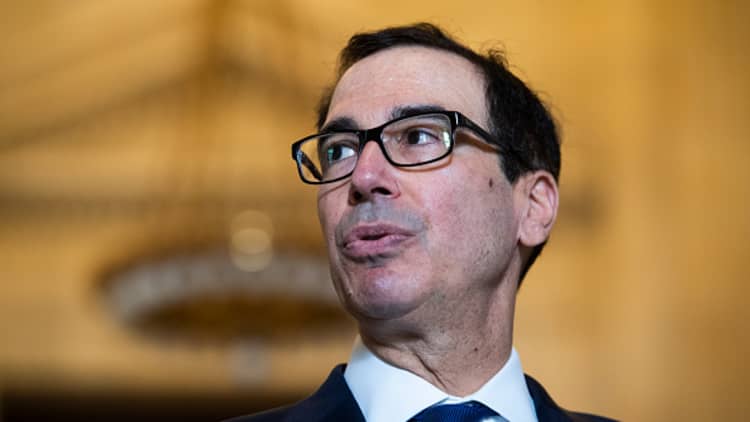In a single week, April Schmidt watched her work calendar for the next month go from completely packed to totally empty thanks to the effects of the coronavirus pandemic. Schmidt, 38, is facing weeks, if not months, of unemployment, she tells CNBC Make It.
As a freelance graphics operator based in Texas, Schmidt works for most of the major sports networks helping to produce programming for everything from Little League to March Madness to college football to the NBA. But to keep players and fans safe as coronavirus spreads, many sporting events have been postponed, if not canceled outright.
That's a big problem for freelancers like Schmidt who work in sports broadcasting because they make the bulk of their annual income in March and April.
Instagram selfie of Schmidt working a sporting event.
"To look at your schedule that was so busy and so many things on the calendar, and then imagine not only is that gone, but you're really not sure when anything will be back — it is a very peculiar feeling," Schmidt says. "It's just a huge question mark of what's next."
Making the situation even more challenging is the fact that both Schmidt and her husband, Joe, work in the sports broadcasting industry. Her husband, who is a full-time employee with a major sports network, has a job that's currently a little more stable, but Schmidt is worried that there may be layoffs in the future.
Because the future is so uncertain, Schmidt is trying to bring in income through other avenues. "I applied to work at the grocery store yesterday, because I thought the grocery stores will be the last man standing in this whole thing," she says. "I make $51 an hour normally, and I applied to a job making $12 an hour, part-time."
Living in a 'limbo state'
Typically, March is the busiest month of the year for those who cover sports, Schmidt says. Starting in March and running through May, many of the nation's top collegiate and professional sports have their playoff and championship games, including the NBA, the NHL, and NCAA basketball's March Madness tournament.
Without those events, there may be long-term ripple effects on the $160 billion sports broadcasting industry, Schmidt says. That will likely make it harder to find employment again when leagues and games do resume. "It could certainly bankrupt a portion of the TV industry and establish a new order of how many people would even be working in the business," she says.
The NBA, for example, had about 21% of its season left when games were postponed because of the coronavirus, according to FiveThirtyEight. If the league doesn't complete the season, the financial fallout could approach $1 billion — and that's before even considering playoffs. Of course, that's just the NBA. Several other major sports have halted, postponed or canceled their seasons and championship series as well, which will have a major impact on those working in sports broadcasting.
Schmidt, in particular, is feeling the loss of those basketball games since she took on more projects for NBA games this year to be able to make it to more of her children's Little League games. "Those nine-year-old home run smiles are priceless," she says. But with the season suspended, that's now a financial liability.
Some networks have come out with action plans to pay TV personnel and freelancers for the events that were scheduled to take place this month, but the future is still largely unknown. Schmidt's next scheduled event — the X Games in Minneapolis — isn't until July.
Instagram photo of April and Joe Schmidt working the Rose Bowl championship game together.
Until more leagues and games resume, the family's financial outlook is in jeopardy, Schmidt says. "We are in a limbo state — we don't know what's going to happen," she says. "We don't have an alternate income as far as something else that would provide income during this time."
To help make their finances stretch as far as possible, Schmidt and her husband are keeping a tight rein on their spending. "We're basically not spending money — minimum payments on whatever [debt] we have, no auxiliary spending whatsoever outside of groceries," she says.
The good news is that the family has about three months' worth of living expenses saved up, so Schmidt feels as though there's not an immediate need to panic. For now, Schmidt is planning to spend quality time with her two kids and will wait to hear if she needs to seriously search for another job should the hiatus last more than a couple of months.
"The money is a big question mark, but the family time — there's no time like the present when it comes to that," Schmidt says. "We've really felt blessed to have this time to come together as a family, slow things down a bit and appreciate what we have," she says, adding that she's trying to also focus on the positive side effects of this health crisis.
"All I need are my kids, my house and a little chocolate — if we can afford that, we'll still be standing."
Check out: The best credit cards of 2020 could earn you over $1,000 in 5 years
Don't miss: Nearly 1 in 3 Americans aren't confident they'll be able to keep a roof over their head if a recession hits



